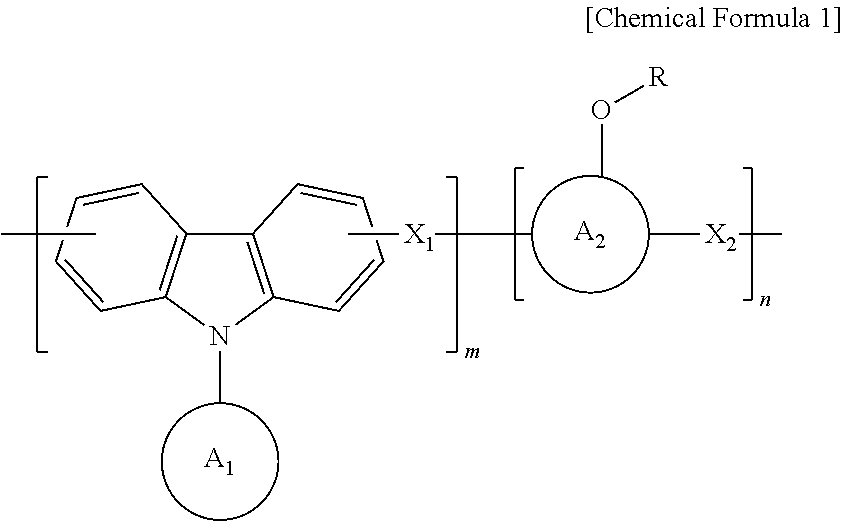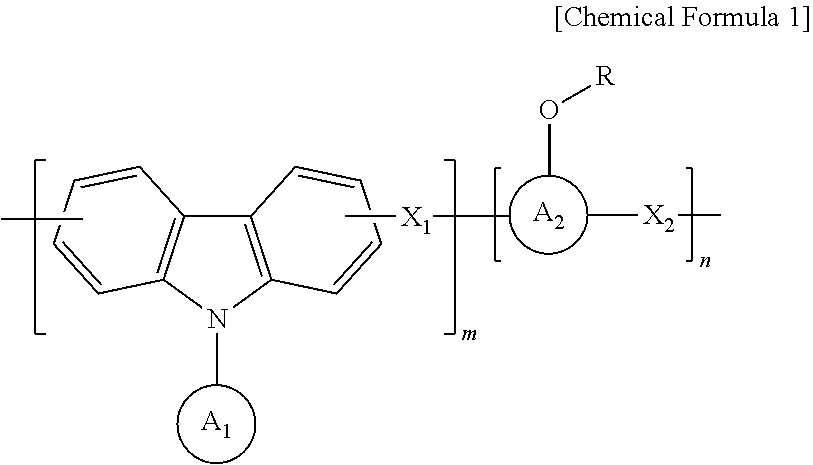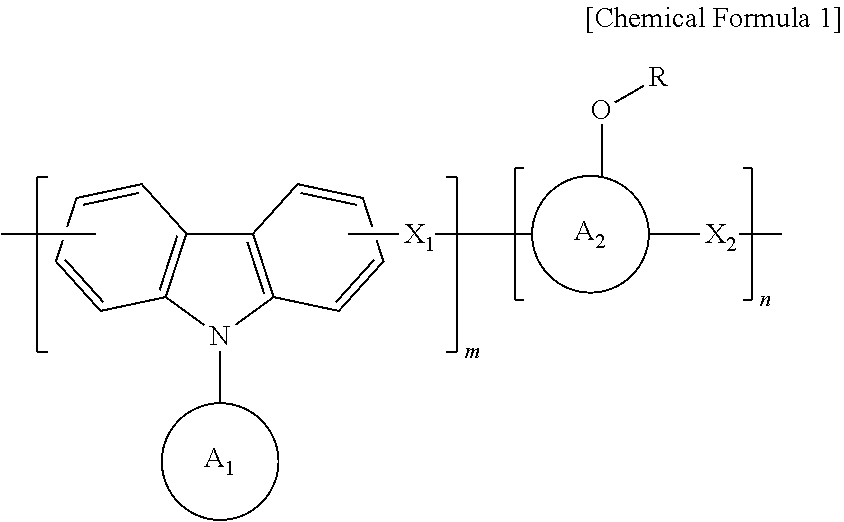Anti-reflective hardmask composition
a composition and hardmask technology, applied in the field of hardmask composition, can solve the problems of poor etching selectivity, difficult for organic hardmask material to serve as a mask during the etching process, inconvenient use of conventional hardmask layer, etc., and achieves high packing density, high polymerization rate, and excellent etching properties.
- Summary
- Abstract
- Description
- Claims
- Application Information
AI Technical Summary
Benefits of technology
Problems solved by technology
Method used
Image
Examples
preparation example 1
[0041]
[0042]In a 250 mL round flask, 12 g (50 mmol) of 9-phenylcarbazole, 12.7 g (120 mmol) of benzaldehyde, and 11 g (50 mmol) of 1-pyrenol were completely dissolved in 85 g of propylene glycol monomethyl ether acetate (PGMEA) at a temperature of 60 degrees, and then 1 g of an undiluted sulfuric acid solution was added thereto.
[0043]After a polymerization reaction was carried out for about 12 hours in a state in which a reaction temperature was maintained at about 120° C.,
[0044]a precipitate formed after dropping a reactant in an excess methanol / water (8:2) co-solvent was dissolved in an appropriate amount of a PGMEA solvent, and then re-precipitated using an excess ethanol / water (8:2) co-solvent.
[0045]A synthesized polymer was dissolved in an appropriate amount of tetrahydrofuran (THF) solvent, and an appropriate amount of triethylamine (TEA) was added thereto. Then, di-t-butyl dicarbonate was added thereto in a concentration of 20 to 100% of pyrenol (aromatic phenol) equivalent, ...
preparation example 2
[0047]
[0048]A polymer was synthesized using 12 g (50 mmol) of 9-phenylcarbazole, 12.7 g (120 mmol) of benzaldehyde, and 11 g (50 mmol) of 1-pyrenol in the same manner as in Preparation Example 1.
[0049]After the synthesized polymer was dissolved in an appropriate amount of tetrahydrofuran (THF) solvent, ethyl vinyl ether was added thereto in a concentration of 20 to 100% of pyrenol (aromatic phenol) equivalent. Then, a catalytic amount of p-toluene sulfonic acid was added thereto, and a reaction was carried out at room temperature for about 4 hours.
[0050]After the reaction was terminated, a reactant was precipitated in an excessive amount of water and then neutralized using triethylamine (TEA). A produced precipitate was filtered and dried in a vacuum oven at 50 degrees for about 20 hours, thereby obtaining a polymer having a weight average molecular weight (Mw) of 2,400.
preparation example 3
[0051]
[0052]A polymer was synthesized using 12 g (50 mmol) of 9-phenylcarbazole, 12.7 g (120 mmol) of benzaldehyde and 11 g (50 mmol) of 1-pyrenol in the same manner as in Preparation Example 1.
[0053]After the synthesized polymer was dissolved in an appropriate amount of tetrahydrofuran (THF) solvent, isobutyl vinyl ether was added thereto in a concentration of 20 to 100% of pyrenol (aromatic phenol) equivalent, and then a polymer was synthesized in the same manner as in Preparation Example 2, thereby obtaining a polymer having a weight average molecular weight (Mw) of 2,500.
PUM
| Property | Measurement | Unit |
|---|---|---|
| wt % | aaaaa | aaaaa |
| wt % | aaaaa | aaaaa |
| temperature | aaaaa | aaaaa |
Abstract
Description
Claims
Application Information
 Login to View More
Login to View More - R&D
- Intellectual Property
- Life Sciences
- Materials
- Tech Scout
- Unparalleled Data Quality
- Higher Quality Content
- 60% Fewer Hallucinations
Browse by: Latest US Patents, China's latest patents, Technical Efficacy Thesaurus, Application Domain, Technology Topic, Popular Technical Reports.
© 2025 PatSnap. All rights reserved.Legal|Privacy policy|Modern Slavery Act Transparency Statement|Sitemap|About US| Contact US: help@patsnap.com



